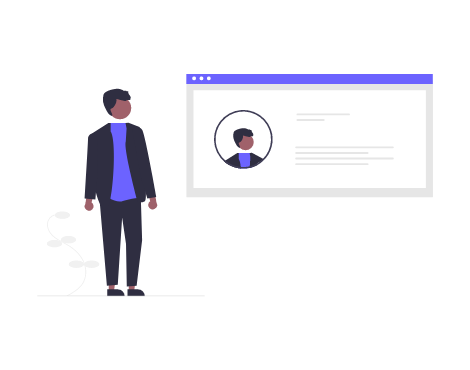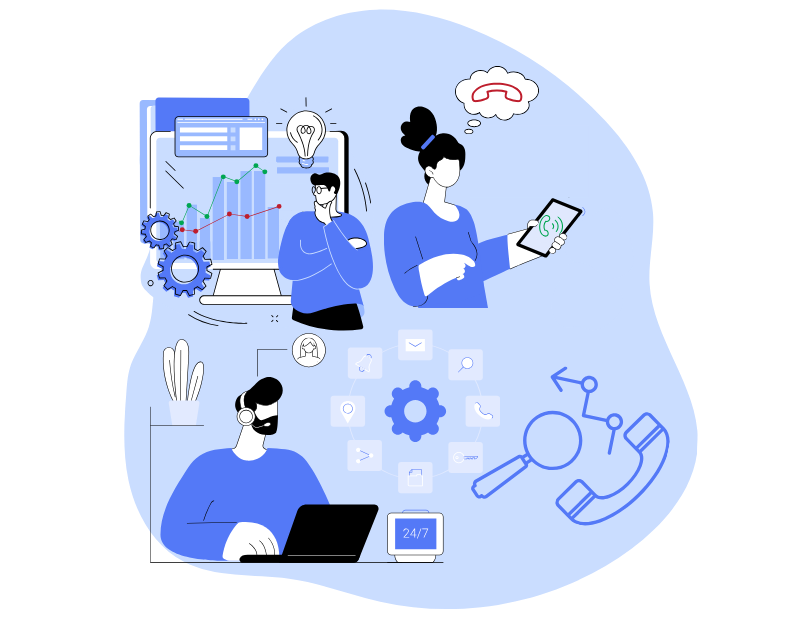Agent Adaptation This is the concluding article on the topic of adapting sales agents and managers. It refers to the manager’s tool. Previous article topics dedicated to the adaptation of new employees:
In this article, we will explain how to organize independent work for sales managers and agents who have recently joined your company.
“Initiation Ritual”
For agent adaptation, we use a simple but fun initiation ritual. Introduce the newcomer to colleagues, other agent participants in the group:
- The presentation (and induction training, if necessary) takes place before the start of the working shift
- The newbie is introduced first, then colleagues are introduced to the newbie
- When introducing a newbie, they talk about his achievements in the training process.
- When introducing colleagues, explain the key achievements of each of them in their work and specify who can be approached regarding which issue. It’s advisable to make a reminder note.
- Colleagues congratulate the newcomer on successful completion of training and gaining independent work clearance. The most experienced agent of the group (but not the supervisor) presents the newcomer with a symbolic gift. Usually, these are all sorts of fun items, but in the simplest variant, we order a mug with the newcomer’s name and corporate symbols.
- After the first call independently handled by a novice, I typically share a story about an agent who, after extensive preparation for a very serious project, brilliantly took the first call and… fainted (a true fact, the receiver just clanked on the floor).
- Here’s the second call the agent should make to the CEO or another top manager of the company (or receive it from them), naturally without knowing about it. At the end of the conversation, the director should introduce himself and also congratulate the agent on the start of independent work. By the way, it’s always very intriguing to watch the expression of the coach during the contact processing, as the coach is present throughout the procedure.
- Following this, the employee receives a personal headset and is considered to have assumed the position of an agent/manager.
Location of the Newbie’s Workstation
Whenever possible, position the newcomer’s workstation as far from operating employees as possible (but not from the mentor/manager). Ideally, in a separate room. The reason is that even the most experienced managers make mistakes in sales, and rookies tend to copy these mistakes (“but Vasya says so too”). Sometimes the situation looks like the department is infected with a mental fungus. That’s how eagerly employees copy each other’s incorrect behavior and ‘corrupt’ newcomers.
Individual Development Plans
The existence of individual (not generalized) development plans (IDPs) for a newcomer is imperative for the adaptation of agents. The IDP should be developed by the manager in collaboration with the newcomer based on the feedback provided by the manager about their performance.
The format of the IDP can vary, but it must definitely include specific goals, clear evaluation criteria, actions to achieve the goals, and check dates. As for dates, I recommend a sampling rate of the plan every 3-4 working days of the manager after the first two weeks, and daily prior to this.
We make use of both graphical and tabular representations of the IDP (the schedule needs to be programmed for departments consisting of more than three people, it takes time to construct). Graphics are convenient for indicating key metrics, while a table is great for task allocation. In principle, tasks can also be displayed in the graphic, but it can become overloaded. This is what it looks like:


Naturally, achieving KPI targets doesn’t happen by itself but rather with the direct help of a mentor or supervisor. Here’s an estimation of the time a senior employee spends on ‘supporting’ a new agent’s KPIs:

“Grace period”
Some organizations, post-an agent’s adaptation and after granting a new manager the permission to work independently, establish a “grace period”. This is the time span during which individual performance indicators do not impact the variable part of the income and the newbie starts earning money. As if their variable portion of the income was fixed at a certain level. I oppose such an approach and believe that if the training is well-organized and the intern passed the final test, they should be “in full gear, just like everyone else”. However, there are exceptions. A “grace period” of 3-5 working days can be set if:
- The project is information-intensive (like banking).
- The firm’s product/service line comprises over 100 positions in the groups served by the manager.
- The manager has to work within more than three information systems simultaneously.
Continuous learning
Often, in small companies with a limited amount of time from qualified trainers, this presents a problem. On the other hand, even with competent training specialists, it can be challenging to withdraw agents or sales managers from the ‘production cycle’ to undergo full-fledged training: someone needs to make calls, answer calls, and make sales every day. Moreover, not all information received at training is assimilated. Depending on the type of training, trainer’s preparation level, and the nature of the material, the effectiveness of the sessions may not exceed 20-30%. Besides, even an ideal training session does not provide stable skills, only knowledge and abilities that must be subsequently reinforced by practice. Therefore, additional ‘mechanics’ that would eliminate these deficiencies is needed.
Solution.
On a daily (this is important) basis, a responsible employee carries out the selection of training material. The responsible employee could be a trainer, and in smaller companies, it could be the sales manager or commercial director (after all, this is their direct responsibility – to manage the qualifications of subordinates, and they themselves will likely discover something new for themselves). The training materials in this case are videos of qualified sales professionals, available for public view. For instance, the Youtube channel of an excellent professional, Evgeny Kolotilov, includes a compilation of more than 400 videos. However, it is not advisable to provide these videos to subordinates in their “pure form”, at the very least because their viewing takes up time: usually 10-15 minutes. Videos need to be downloaded and trimmed so that only one thought, idea, or technique remains. For example, a very effective method:
– Do you have a discount?
-I can mark up.
Evgeny talks for about 5 minutes, while the description of the essence of the method does not take more than 30 seconds. A short thought is easy to understand and remember. It is easy to include it in the seller’s arsenal of methods. From short videos, it’s convenient to assemble a collection that can then be used for quick additional ‘
Improving the skills of novices. Once the videos are ready, they need to be disseminated to the managers’ workstations (it’s great if they have a corporate personal account). After arriving at work, agents can familiarize themselves with the “video of the day” and then start making calls. With the right approach, their “toolbox” will include about 50-60 tools in just three months, which will cover the majority of practical situations. Important! The above does not cancel out other types of regular activities, for example, error analysis with the leader.”
Payment for Regular Training during Agent Adaptation
There is a practice of paying for hours of periodic training at a reduced rate. This leads to managers resisting training and sessions with the supervisor/mentor: “why bother, they pay me less, I’d rather make calls”. But training is necessary, because the business is ultimately interested not in calls, but in the conversion of contacts into deals. Therefore, a novice should receive, based on the [average | forecasted] income at 100% performance of the plan. If this rule is not followed, the employee is demotivated to study.
The Need for Business Knowledge
Successful business individuals clearly understand that customer awareness is key to expanding the customer base and reducing churn. Essential components of that understanding, especially those related to customer behaviour, may be required by a sales manager or contact centre agent in deciding the most optimum approach or characterisation of arguments during sales. The information is typically sourced from the marketing department. If your contact center is outsourced – a dialogue with the customer’s marketers is a must).
Knowledge examples:
On average, 92% of individual customer transitions from ISP №1 to ISP №2 are due to reasons P1, P2, P3, P4 (in order of their importance).
or
According to a study conducted in January 2017, customers residing in Moscow who spend over 2,000 rubles/month on mobile connection, deem savings of less than 400 rubles/month as non-significant and inconsequential to them personally.
These insights should be delivered to managers in small digestible portions for better retention.
“The Sound of the Day”
In the basic version of this methodology, every manager has the right at the end of the day to submit their best or most interesting conversation for management’s consideration. In the course of a mini-contest, one best file is selected daily (it is important to set objective evaluation criteria). The file, along with a new topic video, is brought to all department managers’ attention, at the beginning of the next day’s shift, in the context: “Look, yesterday, agent Vasily conducted a highly competent conversation with the client”. If the conversation is long, it is also truncated. Only the agent’s “star hour” moment is left in the conversation (it is preferable to always do this).
In this form, the scheme works quite well and provides a powerful motivational effect. However, it can be further modified, requesting from the agents only those conversations in which a technique they learned was applied. Additionally, they can be asked to fill out an electronic questionnaire of 2-3 questions. This provides feedback on whether the technique was successful, and if not, why they believe this happened. Overall, the time devoted to studying self-education materials should not take more than 7 minutes a day for any manager.
The practice can be further developed by conducting mini-contests such as “Sale of the week” and “Sale of the month.” In the evaluation of “
The results of which the company’s management must necessarily participate (by the way, this is very interesting, fun and also has a great motivational effect). The director’s time is not much spent, to evaluate 4-5 files per month and select the best does not seem a problem. Here a great scope is opened for the implementation of gamification techniques and the construction of rating systems, aimed at solving the problem of “motivation without investments\”.
The executive team must absolutely be involved in the results of these activities (incidentally, this experience is truly engaging, enjoyable and offers a potent boost in motivation). A modest amount of the director’s time is required, evaluating 4-5 files per month and selecting the best one is by no means a challenging task. This scenario unfolds a vast horizon for the integration of gamification strategies and the establishment of rating systems, specifically designed to tackle the mission of ‘motivation without capital investment’.
Evaluation of Professional Adaptation of Agents
In most cases, a simple table is sufficient:

Evaluation of social adaptation outcomes of agents:
If you want to understand how a newbie has adapted in the group, you can measure his sociometric status index (SSI).
Additions:
- The SSI of a specific employee should be measured no earlier than his 45-50th shift. If you have multiple newbies, it’s advisable to wait until all have “accumulated” a sufficient number of shifts.
- In a group, it is better not to measure SSI more than three times a year.
You can watch a preview of the agent’s work at the Oki-Toki station here.



